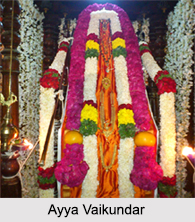 Celebrated on the 20th day of the Tamil month of Masi, the festival of Ayya Vaikunda Avataram is mainly followed by the members of the Ayyavazhi faith. It is a henotheistic belief, which means the followers worship a single God while not denying the existence or possible existence of other deities that originated in South India.
Celebrated on the 20th day of the Tamil month of Masi, the festival of Ayya Vaikunda Avataram is mainly followed by the members of the Ayyavazhi faith. It is a henotheistic belief, which means the followers worship a single God while not denying the existence or possible existence of other deities that originated in South India.
The Ayyavazhis belief that it was on this day that Lord Vaikundar arose from the sea at Thiruchendur as the son of Mummorthies or Trimuti. He was reincarnated as Narayana Pantaram to destroy the evil spirit of Kali and transform the Kali Yuga into Dharma Yukam.
Celebration of Ayya Vaikunda Avataram
Ayya Vaikunda Avataram is the only Ayyavazhi festival which is celebrated simultaneously in all worship centres of Ayyavazhi on 19th Masi, the day before the date of incarnation of Vaikundar. The festival is popular in the states of Tamil Nadu and Kerala and is a local holiday in the districts of Kanyakumari, Tirunelveli and Tuticorin. Grand processions are a major part of the Ayya Vaikunda Avataram festival and listed below are some of the processions:
Thiruchendur Procession: To celebrate the incarnation of Vaikundar from the sea of Thiruchendur, the followers of Ayyavazhi make it a nationwide event by assembling at Thiruchendur on the 19th day of Masi. They gather at the place called Avathara Pathi, it is the place where God incarnates; in this case it is on the sea- shore where Ayya is believed to be incarnated.
![]() On the eve of the festival, various programmes are organized at a grand scale, like hosting several conferences, cultural programs and Anna Dharmams are held and the celebration goes on for the full night. On the day of the festival, at about 8 am in the morning the devotees take a holy dip in the sea of Thiruchendur under the supervision of Payyan, who are part of the Payyan family and are tasked with the duty to manage and administer the temple of Swamithope Pathi. This practise of taking bath at Thiruchendur on the day of Vaikunda Avatar is considered sacred. After the bath, the Payyan applies sacred `Namam` on everybody`s forehead and the procession begins from Tiruchendur under the leadership of Payyan.
On the eve of the festival, various programmes are organized at a grand scale, like hosting several conferences, cultural programs and Anna Dharmams are held and the celebration goes on for the full night. On the day of the festival, at about 8 am in the morning the devotees take a holy dip in the sea of Thiruchendur under the supervision of Payyan, who are part of the Payyan family and are tasked with the duty to manage and administer the temple of Swamithope Pathi. This practise of taking bath at Thiruchendur on the day of Vaikunda Avatar is considered sacred. After the bath, the Payyan applies sacred `Namam` on everybody`s forehead and the procession begins from Tiruchendur under the leadership of Payyan.
Thiruvananthapuram Procession: This procession is organized to celebrate the release of Ayya Vaikundar. On 19th Masi, he was released from the Jail of Singarathoppe after the trial with the king of Travancore, Swathi Thirunal. After the release, his followers carried him in a Vahana to Swamithoppe. So in the memory of this day, his followers assemble at Thiruvananthapuram and go as a procession to Swamithoppe. Most of the participations of this procession are from Kerala and they too are led by a Payyan. The procession starts from East Fort and then after covering various towns finally reaches Athalavilai at around 6.30 pm.
Both the Thiruchendur and Thiruvanathapuram procession unifies at Athalavilai and the Vaikunda Jyothi is lighted on the top of the hillock Vaikunda Malai. Then the procession proceeds to Nagercoil, where a religious conference is held and eminent people participate in the conference. This is followed by cultural and religious programmes and the Ayyavazhi devotees spend the entire night attending the festivities.
The Great Masi Procession: Under the administration of the Payyan, the Great Masi Procession starts on 20th Masi and begins early in the morning. A decorated vahana is carried in front of the procession in which the palm- leaf version is sacredly placed along with decorated elephants and horses, which also participate in the procession. The devotees holding a saffron flag on their hands follow the vahana bare foot chanting religious mantras.
The procession is welcomed by people of different faiths, Christians at Kottar; Muslims at Edalakkudi; and Hindus at Suchindram. They welcome the procession by offering churul or garlands on the way. After covering various areas, the procession reaches Swamithoppe at 12 noon. From here, it goes first to Muthirikkinaru and then through the 4 car streets of Swamithope pathi. Then it goes around the inner- circumambulation route of pathi. As a part of the ritual, the devotees hand over the flags before entering the Pathi.
This grand procession is participated by lakhs of Ayyavazhi followers and thousands of vehicles. The government of Tamil Nadu declared this day as a holiday for the districts of Kanyakumari from 1993 and for Tirunelveli and Tuticorin from the year 2006.
Other than the Ayyavazhi, there are also other religious congregations which organize processions to celebrate the festival of Ayya Vaikunda Avataram.



















